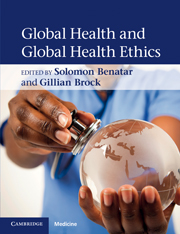Book contents
- Frontmatter
- Contents
- List of contributors
- Introduction
- Section 1 Global health, definitions and descriptions
- Section 2 Global health ethics, responsibilities and justice: some central issues
- 6 Is there a need for global health ethics? For and against
- 7 Justice, infectious diseases and globalization
- 8 International health inequalities and global justice: toward a middle ground
- 9 The human right to health
- 10 Responsibility for global health
- 11 Global health ethics: the rationale for mutual caring
- Section 3 Analyzing some reasons for poor health
- Section 4 Shaping the future
- Index
- References
8 - International health inequalities and global justice: toward a middle ground
Published online by Cambridge University Press: 01 March 2011
- Frontmatter
- Contents
- List of contributors
- Introduction
- Section 1 Global health, definitions and descriptions
- Section 2 Global health ethics, responsibilities and justice: some central issues
- 6 Is there a need for global health ethics? For and against
- 7 Justice, infectious diseases and globalization
- 8 International health inequalities and global justice: toward a middle ground
- 9 The human right to health
- 10 Responsibility for global health
- 11 Global health ethics: the rationale for mutual caring
- Section 3 Analyzing some reasons for poor health
- Section 4 Shaping the future
- Index
- References
Summary
Disturbing international inequalities in health abound. Life expectancy in Swaziland is half that in Japan. A child unfortunate enough to be born in Angola has 73 times as great a chance of dying before age 5 as a child born in Norway. A mother giving birth in southern sub-Saharan Africa has 100 times as great a chance of dying from her labor as one birthing in an industrialized country. For every mile one travels outward toward the Maryland suburbs from downtown Washington, DC on its underground rail system, life expectancy rises by a year – reflecting the race and class inequities in American health. Are the glaring, even larger, international health inequalities also unjust?
All of us no doubt think they are grossly unfortunate. Many of us think they are unfair or unjust. Why should some people be at such a health disadvantage through no fault of their own, losers in a natural and social lottery assigning them birth in an unhealthy place? Others of us are troubled by the absence of the kinds of human relationships that ordinarily give rise to the claims of egalitarian justice that we make on each other – for example, being fellow citizens or even interacting in a cooperative scheme. Who has obligations of justice to reduce these international inequalities? And do those obligations hold regardless of how the inequalities came about? What institutions are accountable for addressing them?
- Type
- Chapter
- Information
- Global Health and Global Health Ethics , pp. 97 - 107Publisher: Cambridge University PressPrint publication year: 2011
References
- 1
- Cited by



